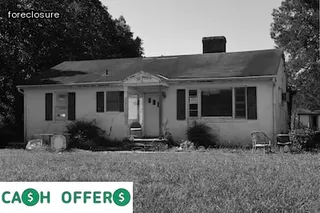Foreclosure in Nebraska is a legal process that can cause financial hardship for homeowners, but it is important to understand the basics of how it works. Foreclosure starts with a missed mortgage payment and proceeds according to specific laws and procedures set forth by the state of Nebraska.
The timeline for foreclosure in Nebraska typically begins when the lender files a complaint and summons with the court system, after which homeowners must respond within 30 days or risk defaulting on the loan. After this, lenders may pursue a foreclosure sale if no other arrangements are made.
Homeowners have certain rights throughout this process which should be carefully considered before taking any action. From understanding deadlines to researching available options, learning about Nebraska’s foreclosure timeline is an essential part of navigating this difficult situation.

It is important to understand the foreclosure timeline in Nebraska and be aware of the state's laws and procedures. During preforeclosure, homeowners have the opportunity to take steps to help them avoid foreclosure.
One option is for a homeowner to apply for a loan modification, which can help reduce monthly payments and make it easier to keep up with mortgage payments. Another option is for a homeowner to sell the property before it enters foreclosure, as this can help them avoid a negative credit report entry that could affect their ability to obtain credit in the future.
Additionally, homeowners may be eligible for government programs or assistance from nonprofit organizations that can provide assistance with mortgage payments or other costs associated with foreclosure. The best course of action for each individual situation will depend on several factors, such as the amount owed on the home and the amount of income available.
Understanding the foreclosure timeline in Nebraska is essential so that homeowners can take advantage of any options available to them during preforeclosure.
Homeowners in Nebraska facing foreclosure must understand their rights during the process. In situations where a homeowner is unable to pay the mortgage, they may be able to enter into a forbearance agreement with the lender and work out another payment plan.
This allows them to delay foreclosure proceedings while they work out an arrangement more suitable for both parties. Additionally, homeowners have the right to request mediation, which involves working with a neutral third party to help negotiate a new repayment plan.
Furthermore, homeowners can also challenge the foreclosure in court if they believe it was done unfairly or illegally. It's important for homeowners in Nebraska to know all of their rights during a foreclosure, so they can make informed decisions that are best suited for their financial situation.

A breach letter is an important part of the foreclosure timeline in Nebraska, as it marks a crucial step in the process. A breach letter is essentially a formal notification from a lender to a homeowner that they have defaulted on their loan and are at risk of being foreclosed.
This letter informs the homeowner of what actions must be taken to remedy the situation, such as paying past due payments, or making other arrangements with the lender. If no action is taken, the lender may begin to pursue legal action and ultimately proceed with foreclosure proceedings.
It's important for homeowners in Nebraska to understand this timeline and how a breach letter can impact their foreclosure case. The sooner they act on the breach letter, the better chance they have at avoiding foreclosure altogether.
In Nebraska, the timeline for foreclosure begins when a homeowner falls behind on their payments. The lender then has to file a Notice of Default with the county courthouse, which starts the 90-day pre-foreclosure period.
During this time, the borrower must pay off any past due amounts or negotiate a repayment plan with the lender in order to avoid foreclosure. If no agreement is reached by the end of this period, then the lender can file for a sheriff's deed to take possession of the home and begin the foreclosure process.
The state then requires that an additional 30-day notice be sent to the homeowner before the sale date is set and foreclosure can proceed. This entire process generally takes about four months from start to finish, but it may vary depending on local regulations and court proceedings.

Navigating Nebraska's foreclosure laws and procedures can be a daunting task for someone unfamiliar with the state's foreclosure timeline. Understanding different types of foreclosures in Nebraska is the first step in navigating the process and making sure you are prepared to handle it appropriately.
Foreclosures come in two main varieties: judicial and non-judicial. Judicial foreclosures require a court order and involve more time than non-judicial foreclosures, which typically take only a few months from start to finish.
Many states have implemented additional forms of foreclosure such as deed-in-lieu or short sale, both of which may be available in Nebraska depending on your particular situation. It is important to research all of your options before deciding how to proceed with your foreclosure case.
Each type of foreclosure has its own set of pros and cons, so it is important to weigh each option carefully before making any decisions regarding your financial future.
Navigating the steps of a Nebraska foreclosure process can be complex and overwhelming. Understanding the timeline of a Nebraska foreclosure is essential to preventing or navigating through one successfully.
When facing a foreclosure in Nebraska, it is important to have an understanding of the laws and procedures, as well as the different steps involved in the process. These include filing for foreclosure; receiving notice from the lender; attending court hearings; auctioning off the property; repaying any deficiency balances owed; and finally, resolving any remaining issues with title.
During each step, it is important to review all documents carefully and thoroughly understand what must be done in order to proceed. Additionally, seeking professional legal counsel may be beneficial to ensure that all state laws are being followed throughout the process.

For Nebraska homeowners facing foreclosure, the best strategy is to act quickly. There are certain steps that can be taken to prevent a home from going into foreclosure, or at least to delay the process.
One of the most important is to contact your lender as soon as possible. This will open up the possibility of loan modification, forbearance, and other options that may help you catch up on payments and avoid foreclosure.
Additionally, you could consider refinancing your loan with a different lender who may offer more favorable terms and lower interest rates. It is also possible to negotiate directly with your lender so they are aware of your situation and understand that you are taking proactive steps in trying to keep up with payments.
You may also qualify for assistance through state or local government programs such as mortgage assistance or counseling services which can help provide financial guidance and advice during this difficult time. Finally, it is important to explore bankruptcy as a last-resort option if all else fails.
Consulting an experienced attorney will help ensure that you understand all potential outcomes associated with filing for bankruptcy protection so you can make an informed decision about this course of action.
In Nebraska, a deficiency judgment can be requested by the lender after a foreclosure sale. A deficiency judgment is a court-ordered payment from the borrower to the lender for any remaining debt owed on the property.
This amount is calculated after sale proceeds have been applied to the loan balance. Nebraska state laws provide protections for borrowers concerning deficiency judgments.
For example, if the fair market value of the foreclosed home is less than the amount of debt owed, then no further action or payments can be requested by the lender. Additionally, lenders must obtain permission from a court in order to collect a deficiency judgment and must prove that they are legally entitled to such an action.
Borrowers should also be aware that while courts may not allow them to owe additional amounts beyond their original loan balance, they may still be responsible for legal costs associated with obtaining a deficiency judgment. Understanding these laws and procedures is key for navigating Nebraska's foreclosure timeline.

The foreclosure process in Nebraska can be a stressful and confusing time, but there is help available to those facing foreclosure. Homeowners should first contact their lender or servicer as soon as they know they are having difficulty making payments.
The lender may be able to provide options such as refinancing, loan modifications, or forbearance that can help homeowners keep their home. If the homeowner cannot get assistance from the lender, they should reach out to housing counselors and legal aid services that offer free advice on how to handle the situation.
Additionally, reaching out to government programs such as the US Department of Housing and Urban Development's Housing Counseling Program or the Nebraska Foreclosure Mediation Program may provide additional resources that can help during a residential foreclosure in Nebraska.
In Nebraska, the foreclosure process with a deed of trust follows a specific timeline and involves certain laws and procedures. This guide will explain how to understand and navigate the Nebraska foreclosure timeline.
When a homeowner defaults on their mortgage, the lender can begin the foreclosure process by filing a Notice of Default. This document provides the homeowner with an opportunity to pay off their debt within a certain time frame or face foreclosure proceedings.
After that period has expired, the lender can then initiate the foreclosure sale by issuing a Notice of Sale to be published in local newspapers. The homeowner must receive this notice at least 20 days before the auction date, which is when the property will be publicly auctioned off to the highest bidder.
During this time, homeowners may have access to options like loan modifications or repayment plans that could help them save their home from foreclosure. It is important for homeowners to understand all aspects of the foreclosure process so that they can make informed decisions about how best to deal with their situation.

As the foreclosure process can be an intimidating and difficult experience, seeking professional assistance is often beneficial to better understand and navigate Nebraska’s state laws and procedures. There are several types of professionals that can help you with the foreclosure timeline, such as a housing counselor, real estate attorney, bankruptcy lawyer or credit counselor.
A housing counselor is knowledgeable in the area of foreclosure and can provide advice on avoiding or stopping the foreclosure process. A real estate attorney may be able to assist in negotiating a payment plan or loan modification with your lender.
Bankruptcy lawyers can provide advice on filing for bankruptcy if it makes sense for you financially. Finally, a credit counselor can help improve your credit score so that you may qualify for other mortgages in the future.
Professional assistance from any of these experts during the foreclosure process can be invaluable in helping you make informed decisions about your financial situation.
If you're facing foreclosure in Nebraska, it's important to find an experienced bankruptcy lawyer who can help you navigate the state's foreclosure laws and procedures. It is essential to work with an attorney who understands the complexities of the foreclosure timeline in Nebraska and can provide sound legal advice.
When seeking a lawyer, look for someone who is knowledgeable about the local laws and regulations related to foreclosure proceedings, as well as any available resources that could help you during this difficult process. Be sure to ask questions about their experience handling cases like yours, so that you can feel confident in their ability to provide the best possible legal counsel.
Additionally, make sure your lawyer has a good rapport with other attorneys and professionals that may be involved in your case; having an attorney who knows how to communicate effectively with others on your behalf can make all the difference.

When facing the difficult decision of whether to hire an attorney for a foreclosure, it is important to consider the potential benefits. Some of the most compelling reasons include having access to legal advice and support, understanding the legal implications of each step of the process, and being able to negotiate with creditors or other parties involved in a foreclosure.
An attorney can also provide representation in court when necessary, offering a greater chance at protecting your rights and interests. Furthermore, attorneys are more familiar with state laws and regulations related to foreclosures than non-lawyers, allowing them to provide more accurate information about the timeline and procedures associated with Nebraska's foreclosure process.
Hiring an attorney can reduce stress by providing peace of mind that someone is working on your behalf, helping you navigate through the complexities of foreclosure law.
When a Notice of Default is filed against you in Nebraska, it can be difficult to understand your options and how to navigate the state's foreclosure laws and procedures. Fortunately, there are resources available for homeowners who need assistance understanding the timeline of foreclosure in Nebraska.
One of the first steps to take after a Notice of Default is filed is to speak with an experienced legal professional who can advise you on your rights as well as provide information about possible solutions. If you decide to pursue a loan modification or repayment plan, it's important to make sure that all documents are accurately filled out and submitted on time.
You may also have the option to sell your home in order to pay off any outstanding debt; however, this should only be done if you have exhausted all other possible options. Additionally, it's important to stay informed throughout the entire process by attending court hearings and researching any filing requirements or deadlines related to your case.
With the right guidance and an understanding of the foreclosure timeline in Nebraska, homeowners can successfully navigate through this difficult process while protecting their rights along the way.

Filing for bankruptcy is one way to stop the foreclosure process in Nebraska. It can be a complex and daunting task, but understanding the basics of bankruptcy law in Nebraska can help you determine if it is the right option for you.
There are two types of bankruptcies most commonly used by individuals in Nebraska: Chapter 7 and Chapter 13. In Chapter 7 bankruptcy, all of your assets may be liquidated and the proceeds go to pay off your creditors.
With Chapter 13, you will be able to keep some of your assets and create a repayment plan with your creditors that allows you to pay back a portion or all of what you owe over an extended period of time. You must also complete a credit counseling course before filing for either type of bankruptcy.
Additionally, there are specific timelines in place that dictate how long it takes for the process to be completed; these vary depending on whether you are filing for Chapter 7 or Chapter 13. Understanding these timelines is essential when considering filing for bankruptcy as a way to stop foreclosure proceedings in Nebraska.
When negotiating with lenders in Nebraska to avoid or delay a foreclosure, it is important to be informed of the state's foreclosure timeline and laws. It can be helpful to have an understanding of the process and timeline, as well as any potential options that may be available before beginning negotiations.
Start by learning what type of mortgage loan you have, which will determine the timeline and procedures for foreclosure. Then, consider any options available to you that may allow you to remain in your home, such as a loan modification or forbearance.
Additionally, familiarize yourself with the relevant state laws surrounding foreclosure notices, redemption periods and more in order to understand your rights throughout the process. Negotiations should be handled carefully and respectfully; this includes having all paperwork prepared beforehand so that all parties are fully aware of what is being discussed.
Ultimately, communication is key when attempting to negotiate with lenders in Nebraska - work with them to come up with a reasonable solution that meets both your needs and prevents a foreclosure from occurring.

The foreclosure process in Nebraska can take between 6 to 12 months from the initial filing to the completion of the foreclosure sale. The timeline is divided into three distinct stages: Pre-Foreclosure, Foreclosure, and Post-Foreclosure. During the Pre-Foreclosure stage, the lender will file a Notice of Default with the court.
This notice alerts homeowners of their default and gives them 30 days to catch up on payments or face foreclosure proceedings. During this period, borrowers can also negotiate a payment plan or other resolution with their lender to avoid foreclosure. Following the Notice of Default is a series of legal filings that start the Foreclosure stage.
This includes a Summons and Complaint filed by the lender in court which allows them to begin the process of taking ownership of the borrower’s home if they are unable to make an agreement with their lender. After this filing, homeowners typically have 20 days to respond by either paying off outstanding debts or contesting their case in court. If no agreement is reached between homeowner and lender during this period, then a Final Judgment and Order is made by a judge that allows for foreclosure proceedings to commence.
Finally, during Post-Foreclosure, once all legal paperwork is completed, a public auction takes place where creditors may bid on properties as repayment for outstanding debt owed by borrowers. Ultimately, how long it takes for a property to go through Nebraska’s entire foreclosure process depends on how much time it takes for lenders and homeowners to come to an agreement about payments or other resolutions before it reaches its final stage—the auction sale at which point ownership of property transfers from borrower to creditor.
When facing foreclosure, it is important to understand the timeline in Nebraska and explore all options before allowing a judicial sale of your property. One option to consider is mediation services, which may help you resolve disputes with lenders and avoid a judicial sale.
Mediation allows both parties to negotiate an agreement that meets their needs while avoiding costly litigation. Mediators are impartial third-party professionals who can help facilitate an agreement between the lender and borrower that could potentially avoid foreclosure.
These services can be especially helpful if the borrower has valid defenses or counterclaims against the lender, such as violations of the Fair Debt Collection Practices Act (FDCPA), or if they are able to negotiate a settlement on the loan or repayment plan that works for both parties. Additionally, mediation can provide borrowers with more time to explore other options and try to save their home from foreclosure.
It is important for borrowers to remember that mediation does not guarantee a successful outcome, but it could result in significant savings of time and money for everyone involved.

It is important to understand the timeline of a foreclosure in Nebraska and the state's laws and procedures before attempting to navigate this complex process. Being aware of potential liabilities that may arise following a completed foreclosure is essential in order to protect yourself from any financial or legal repercussions.
While the steps involved can vary depending on circumstances, it is generally recommended that an individual contact a qualified attorney for advice about how best to proceed. The attorney can guide you through the pre-foreclosure period, which typically includes sending delinquent notices to homeowners, filing suit against the homeowner if necessary, and obtaining judgment.
After judgment has been granted against the homeowner, they will be provided with a certain amount of time to settle their delinquency or surrender their property. If they fail to do so within this time frame, the lender may then move forward with scheduling an auction off of their property.
It is essential for those facing foreclosure to understand that although they may have little control over these proceedings, they can take action during this period in order to protect themselves from potential liabilities.
In Nebraska, foreclosure is a legal process whereby a lender seeks to recover the balance of debt owed on a defaulted loan by forcing the sale of the property used as collateral. The foreclosure timeline begins when the borrower stops making payments on the loan and defaults.
The lender must then file a Notice of Default with the county courthouse in which the property is located. After this Notice is filed, there is typically a three-month period for redemption during which time the borrower can make up past due payments or refinance their loan to avoid foreclosure.
If there is no redemption during this time, then an auction date will be set and advertised in local newspapers. At this auction, interested buyers may bid on the property with any liens being satisfied after the sale proceeds are received by the lender.
Finally, if no bids are received at auction or they are unsatisfactory to the lender, then they may repossess and take possession of the property themselves to satisfy their debt. Understanding these steps and navigating Nebraska's foreclosure laws and procedures can help borrowers avoid foreclosure if possible or minimize its effects if not.

If you are facing foreclosure in Nebraska, it is important to know your options and take action quickly. The first step is to contact your mortgage lender or servicer as soon as possible.
There may be a solution that allows you to keep your home, such as a loan modification, forbearance agreement, or repayment plan. You can also explore other options like a short sale, deed-in-lieu of foreclosure, or cash for keys program.
If none of these options are available to you, then you can also consider filing for bankruptcy protection in order to delay the foreclosure process. It is important to speak with an attorney who specializes in bankruptcy law and foreclosure defense in order to understand the timeline and navigate Nebraska's laws and procedures.
With the right help and knowledge, it is possible to stop the foreclosure process in Nebraska and save your home.
In Nebraska, homeowners are typically in danger of foreclosure once they become three months behind on their mortgage payments.
The foreclosure process begins with a notice of default and continues through other steps, such as the trustee sale.
The timeline for foreclosure can vary depending on the county or situation, but it’s important to be aware that you may go into foreclosure if your payments are more than three months past due.
If you’re facing potential foreclosure, it’s important to understand the timeline so that you can take action to avoid or postpone it.
Nebraska has the longest foreclosure process of any state in the country.
Nebraska's laws and procedures for foreclosure involve several steps that can stretch the entire process out to almost a year or longer.
Understanding the timeline for foreclosure in Nebraska is critical for anyone facing foreclosure in the state, as being aware of the stages involved will help them better navigate their situation and make informed decisions about how to proceed.
This guide will provide an overview of each step in the Nebraska foreclosure timeline, from pre-foreclosure to post-foreclosure, so that individuals can be fully informed about their rights and obligations during this difficult time.
A: The exact timeline of the foreclosure process in Nebraska is determined by individual lenders and can vary, but typically it takes between 90-180 days from the initial missed payment until the homeowner loses their property. Homeowners should consider working with their lender to explore options such as loss mitigation before the foreclosure process begins.
A: The foreclosure process in Nebraska typically takes between 4-6 months.

A: In Nebraska, mortgage servicers must adhere to a timeline set by state law. The process typically takes between 3-5 months from when the initial notice of default is issued.
A: The time frame for a foreclosure process in Nebraska can vary greatly depending on the circumstances and if the homeowner is litigating or filing for Chapter 13 Bankruptcy. Generally, the process can take anywhere from three months to more than one year.
A: The typical foreclosure process in Nebraska can take up to 9-12 months, depending on if the homeowner is litigating, filing for Chapter 13 bankruptcy or other defenses.

A: The foreclosure process in Nebraska generally takes between three and five months, depending on whether the homeowner is able to pay off their debt before the foreclosure is finalized.
A: The length of time it takes for a foreclosure to be completed in Nebraska varies depending on how the homeowner responds to the request for payment. Generally, if the homeowner chooses to litigate or file for Chapter 13 bankruptcy, it can take up to two years or more before the foreclosure is complete. If, however, the homeowner chooses not to fight the foreclosure and follows all steps of the Privacy Policy as outlined by their servicer, it may take as little as six months for completion.
A: The pandemic has had an impact on foreclosures in Nebraska, as many court proceedings have been delayed due to safety concerns. This can lengthen the foreclosure process, as court hearings and other legal processes may take longer to be completed. Additionally, homeowners may have privacy concerns when communicating with their mortgage servicer about foreclosure options during the pandemic. Therefore, it is important for homeowners to be aware of their rights and to use secure messaging or phone calls when discussing sensitive information with their lender.

A: Federal law requires that lenders provide homeowners with a minimum of 90 days notice before initiating foreclosure proceedings. Additionally, if the homeowner is serviced by a mortgage and is litigating or filing for Chapter 13 bankruptcy, the foreclosure process may be delayed.
A: Late fees generally accrue each month after a payment has been missed. While the amount of late fees varies depending on the loan servicer, Federal guidance does not apply to foreclosure proceedings in Nebraska.
A: The length of the foreclosure process in Nebraska when emails are used for communication can vary depending on the nature of the case. Generally, however, it can take anywhere from four to eight months for the entire process to be completed.

A: The timeline for completing the foreclosure process in Nebraska when a homeowner is exercising their contractual rights to a Deed in Lieu of Foreclosure can vary. Generally, it takes approximately 120 days from the date the Deed in Lieu of Foreclosure documents are signed and filed with the county clerk's office until the sale of the property is finalized, although pandemic-related delays may extend this time frame.
A: The foreclosure process can take up to 6 months in Nebraska, depending on the terms of the contract and the laws and procedures set by the state. According to Nebraska's foreclosure laws, lenders must provide homeowners with at least 30 days notice before beginning foreclosure proceedings. Once the deed in lieu of foreclosure has been accepted, it typically takes about 2-3 weeks for the paperwork to be processed and finalized.